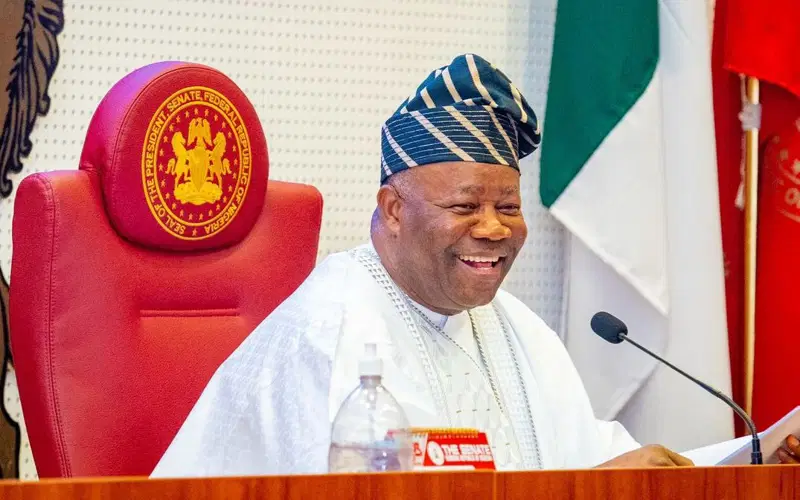Nigeria is facing its worst economic crisis in decades, with skyrocketing inflation, a national currency in free-fall and millions of people struggling to buy food

Opeyemi Olamilekan
Ahead of the hunger protest scheduled to begin on Thursday, 1 August, Nigeria’s Senate President, Godswill Akpabio, has mocked organisers to go ahead with the demonstration while they watch on eating.
Akpabio said this on Tuesday while addressing delegates of the Niger Delta Development Commission (NDDC) in Rivers State.
The Niger-Delta people are not ready for a regime change, the Senate President said, while referencing the statement of the MD of the commission.
“All of us feel the impact of what is happening now. But we are aware it will be for a short while. MD, I want to thank you for what you said. You said we are not interested in regime change; let us own this government.
“Those who want to protest can protest, but let us be there eating — I must thank the Niger Delta.
“We acknowledge the fact that the impact of oil and gas activities in our region has done immeasurable damage to our people,” he said.
The Senate President, who seems displeased with the planned protest, assured that the National Assembly is ready to help with legislation to curb oil spillage and environmental pollution in the region.
“The specific issues faced by the Niger Delta must be contained in that communique because we are going to make it available to Mr President.
“The ones that need legislation will come to us, the ones that need intervention will go to NDDC, the ones that need more money will go to the president and commander-in-chief and I assure you that those issues will be addressed,” he maintained.
Nigeria is facing its worst economic crisis in decades, with skyrocketing inflation, a national currency in free-fall and millions of people struggling to buy food. Only two years ago Africa’s biggest economy, Nigeria is projected to drop to fourth place this year.
The pain is widespread. Unions strike to protest salaries of around $20 a month. People die in stampedes, desperate for free sacks of rice. Hospitals are overrun with women wracked by spasms from calcium deficiencies.
Although President Bola Tinubu increased the minimum wage — after strike action and months-long negotiations with labour unions — from N30,000 to N70,000, his government has increased spending for officials at a time of nationwide starvation.
For workers earning the new N70,000, or $43, per month minimum wage, capricious inflation and naira value have inflicted too much damage for the changes to make any difference in their lives.
The crisis is largely believed to be rooted in two major changes implemented by Mr Tinubu, elected 14 months ago: the partial removal of fuel subsidies and the floating of the currency, which together have caused major price rises.
A nation of entrepreneurs, Nigeria’s more than 200 million citizens are skilled at managing in tough circumstances, without the services states usually provide. They generate their own electricity and source their own water. They take up arms and defend their communities when the armed forces cannot. They negotiate with armed kidnappers when family members are abducted.
But right now, their resourcefulness is being stretched to the limit.
Some folks are planning protests to voice their concerns about the economic situation, including rising inflation and poverty, under President Tinubu’s administration.
The protests are expected to happen in the north and other parts of the country, but residents and leaders of the south-eastern region, inhabited by the Igbo ethnic group – have made it clear that they are not going to be part of the mass action.
The planned protests have already ignited debates on social media between Mr Tinubu’s supporters — who had previously advocated for similar protests under former president Goodluck Jonathan in 2012 — and next month’s would-be demonstrators.
Mr Tinubu’s government warned that a breakdown of law would not be tolerated, while Nigerians were furious that the same individuals who, in 2012, organised demonstrations against Mr Jonathan’s government for terminating fuel subsidies are now aggressively opposing the same cause under a different leader.
KOIKI Media bringing the world 🌎 closer to your door step
